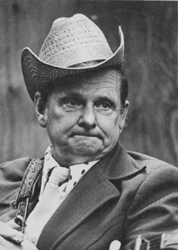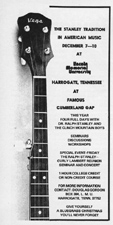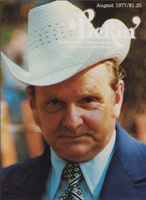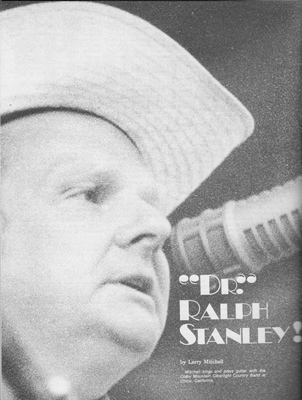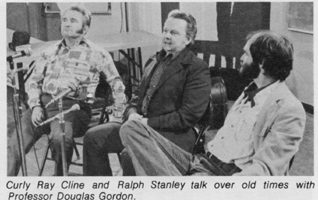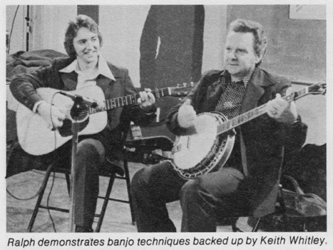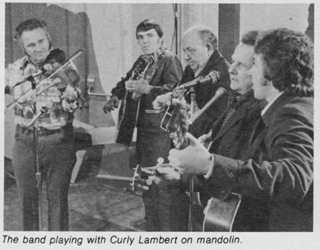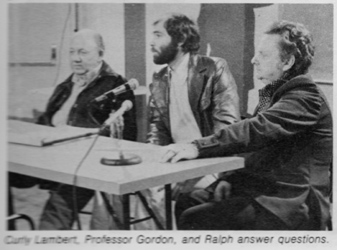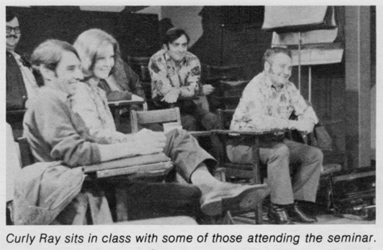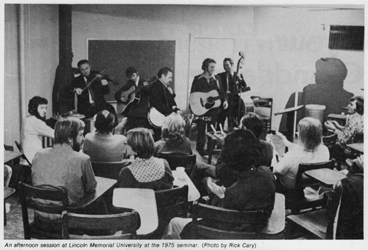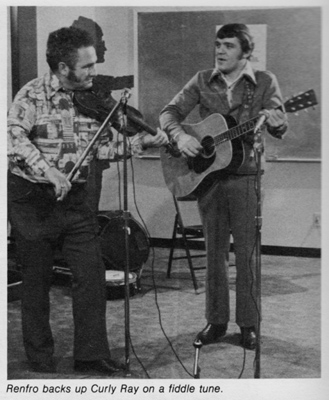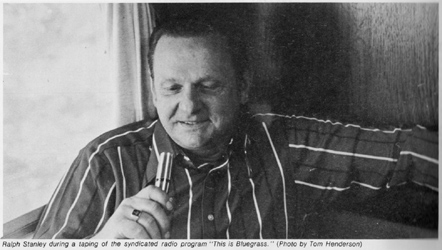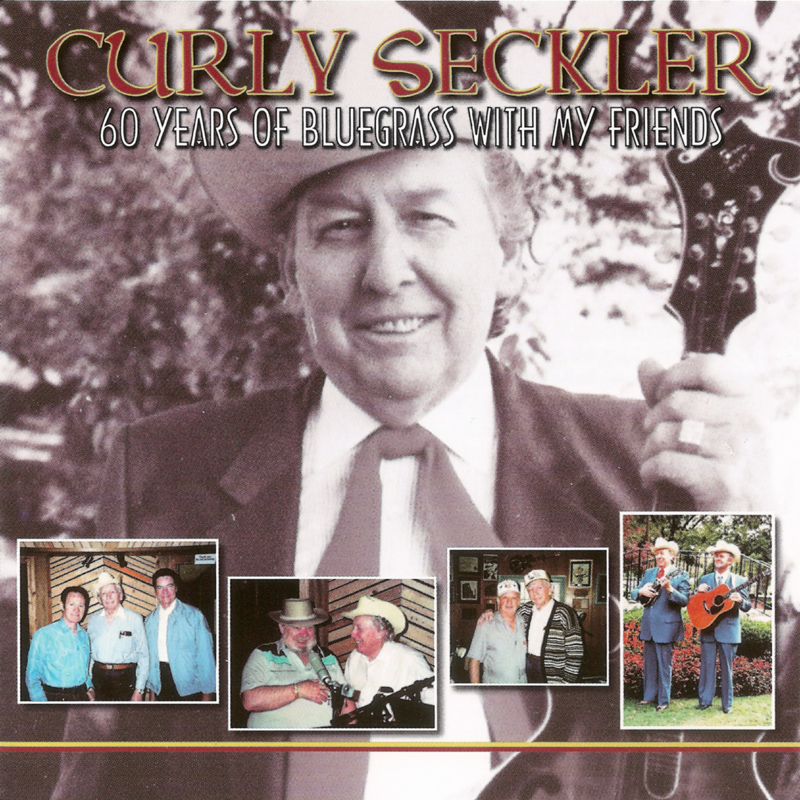- Bill Gatton Chevy Show
- Carter Stanley Interview - 1966
- Jim Kent's film 'Ralph Stanley's Bluegrass Festival'
- New WCYB Recording
- Pound Va. 1972 - Video
- Replica Rebel T-Shirt
- R.I.P. Ralph
- Roy Lee Centers Last Show
- Song & Memory Books
- Stanley Brothers - WCYB Acetate
- Stanley Standard - Carter Stanley Memorial Issue
- Suwannee River Jamboree
- Up In The Cloud - 1957-62
When Ralph went back to school...
Ralph:- "My doctor's degree? Well, this professor, Doug Gordon, at Lincoln Memorial University, he believed in this style, and he got me to come down there. He hired me two or three times to come to the university and we had classes on it. We had classes that I taught on music, you know, and he advertised it and had people to come in from several states.... I taught them all that I knew. And when I finished they gave me that degree. But I could've told them in three minutes all I know. What would I have said? I don't know nothing."[1]
"Getting the honorary degree in music... I took that pretty seriously... and I'm real proud of it"[2]
How Ralph got his first honorary doctorate has always intrigued me. He obviously cherised the title, and it's usage became much more prevalent in later years, when Ralph had become the 'pater familias' of bluegrass.
At school, Ralph and Carter were discouraged from following music as a career by the school principal, so becoming a "Dr." was recognition from the educational establishment and a vindication of the Stanley's career choice. Ralph's pride may also have had something to do with the veterinary career which Ralph studied for, and the choices he made. For example, as a child he had to choose between a pig or his Aunt's banjo as a present; then when returning from the Army, whether to continue with his studies or choose music as a career; and later when the times with The Stanley Brothers got lean, whether to stick with it.
There were two sets of seminars organised by Prof. Douglas Gordon, then head of the English Dept. at Lincoln Memorial University (LMU) in Harrogate, Tn. The first, ran 2nd-5th Dec. 1975 and was billed as 'The Stanley Sound In American Music'.[3] It looks likely that it was attended by 30-50 students, and audio and video tapes from the sessions were tantalising mentioned in 'Bluegrass Unlimited' as being available for rent, with funds going towards the Stanley Scholarship scheme.[4]
As a result of the 1975 seminars, at the 6th annual 'Hills Of Home' festival 27th-30th May 1976, Ralph was presented with an honorary Doctorate in the Arts from Lincoln Memorial University. Two 'Ralph and Carter Stanley' scholarships were also awarded to deserving students from the Dickenson Country area to study at the Lincoln Memorial University, funded by general contributions.[5]
A second series of seminars was arranged for 7th-10th Dec. 1976, but these were not as well attended. An article in 'Pickin' magazine (Aug. 1977), gave a synopsis from one of the students, which I've reproduced below. This gives quite a contrast to Ralph's recollections of the events in his 'Man Of Constant Sorrow' book.[2]
In Ralph's biography, where he says "on the same day I got my doctorate I got a bill I wan't expecting", I think he had forgot that he'd already been awarded the honour in a ceremony at the 'Hills Of Home' festival the previous May. His description of how the band at the end of the seminars, trashed the motel room by throwing firecrackers at Curley Lambert's forehead, is however definitely unexpected!
The 'Pickin' article below also mentions that some of the sessions were video-taped by Broadside TV. Some of these tapes still survive and are now held in the archives of East Tennessee State University (along with several mouth-watering Stanley material)[6] From the scant info listed online, it looks like the complete concert, which ended the Seminar on the 10th Dec 1976 exists as both raw footage and edited master, and several hours of the seminar footage from the 8th-10th Dec. is also in the vault along with a copy of the concert poster signed by all the band members...
It sounds like this would make a good retrospective DVD release, if the footage was good enough quality...
"Dr." Ralph Stanley
by Larry Mitchell
The 727 flew low through grey clouds, as I looked down at the misty Tennessee landscape - bare trees, muddy ponds, and farmhouses scattered here and there.
Never partial to flying, I held my breath as the plane bumped along over "rough air" and seemed to careen blindly through the clouds. But a few minutes later, we had landed on a rainy runway in Knoxville. Soon I was on board a Greyhound, headed for Harrogate, Tennessee and a meeting with Ralph Stanley and the Clinch Mountain Boys.
I didn't know what to expect. Back in October I'd seen an ad in Bluegrass (Unlimited) magazine for a four-day course to be taught by Dr. Ralph Stanley at Lincoln Memorial University. "Give Yourself A Bluegrass Christmas You'll Never Forget," the ad said.
One way or another, I decided, I'd have to go to that thing. I'd been playing, singing, and listening to Stanley Brothers tunes for too long without having seen Ralph and his band. And it seemed like they would never come out to California where I live. Life's too short to wait forever, I told myself.
But arriving in Harrogate that rainy Monday night in December I was nervous. There is no Greyhound bus depot in Harrogate. The bus dropped me off at "The Sundries", a cafe and store right across the freeway from the University. Not knowing where I would spend the night, I lugged my guitar, suitcase, sleeping bag, and travelling case containing tape recorder, camera, and other paraphernalia into the Sundries and threw myself on the mercy of the proprietors. They kindly owner gave me a ride to a relatively inexpensive motel right up the hill at Cumberland Gap.
In the morning it was still drizzling as I walked a mile or so down from the Gap and found the small auditorium-like classroom on the campus where the seminar was to be held. There were only about a dozen or so people in the room waiting for Ralph to arrive. I wondered if he would really show up, or if the whole thing were some sort of hoax.
But shortly before 10 a.m., into the room, smiling broadly and carrying a guitar came Keith Whitley. And a little behind him followed Raph and the rest of he band. Ralph was dressed in a blue suit, and a checked blue shirt with no tie. He seemed smaller than I had imagined. In fact, everyone in the band looked very short. Ralph seemed shy, somehow reserved and distant.
That first session began with Dr. Douglas Gordon, the English professor at LMU who had organized the class, welcoming everyone and calling Ralph and the group up to play some tunes.
It was hard to believe I was really there. But once they started singing I knew it was real. There was that powerful Stanley sound, so familiar.
The band played for about an hour and then Ralph hosted something like a press conference, answering questions from Dr. Gordon and those in the class.
Here are some of the things Ralph said at that session:
- About the new Stelling banjo he'd played since last August: "Geoff Stelling invited me to use this banjo. It's as good as any of the new banjos. I wouldn't say it's better than the old ones."
- "I put my time to my singing. I like singing much more (than banjo picking). It would suit me to lay the banjo down and just sing."
- "All the tunes I write are real simple. They're so simple that a good musician can't play them. I've really had good banjo players tell me that. They couldn't play it. It was too simple."
- That the Stanley Brothers never played at the Grand Ole Opry. "Years ago there was a lot of jealousy in this music. In the ealy '40s, Bill didn't seem to want anyone else to play it. Bill didn't want any other old-time music getting into the Grand Ole Opry."
- That he doesn't particularly like lead guitar. even though he has used it a lot in his music. "I don't care for it that much. A lot of people do."
- "Bill Monroe was always my favorite entertainer. Also Chubby Wise and Curly Ray Cline. G.B. Grayson did some of the prettiest fiddling I ever heard."
- "At home or on the road I listen mostly to the Marshall Family. I like gospel music and they're out of this world. I also like George Jones, Merle Haggard, and Dolly Parton."
- That of the songs he's sung, he's especially proud of "Rank Stranger", "White Dove", "Man Of Constant Sorrow", "A little Boy Called Joe", "Shotgun Slade", and "Will You Miss Me".
- That he would encourage young musicians to find their own sound: "Get licks (from other musicians), but use them the way you feel it. Ninety percent of Bluegrass bands today, unless you're watching it, you can't tell who it is. You'll find a lot of groups that will go on with a bang on stage, but they aren't making a living at it."
Monday afternoon Ralph talked about what it was like growing up at McClure with Carter and how they started playing music. It was pretty much the same routine day after day, he said. "Every morning we'd get up at 4:30 or 5. We lived on a little farm. We'd milk the cows, feed the horses and chickens, and then walk three miles to school. We'd do the chores after school, then go to bed, and do the same thing the next day."
An old friend of Ralph's, Jewel Martin, who said he grew up with Ralph and Carter in Dickenson County, was at the seminar on Friday. He talked about how they all used to play music together when they were young boys. He recalled that Carter had a guitar that cost about three dollars and had a picture of a cowboy on it.
When they were about fourteen years old, Martin said, they were in a band together that they called the Lazy Ramblers. "We were all just learning to play," Martin said. "If one of us learned a new chord or run, we couldn't wait until we showed the others."
It was their Mother who gave them the most encouragement about music in those early days, Ralph recalled. "Our mother always liked for us to play. Our Daddy hated it. All he'd have to do is stamp his foot about three times and we'd head out to the barn and play. After we got popular, though, he'd be real proud of us."
Ralph said after he graduated from high school in 1945 he went into the Army, but was discharged a few months later. When he got out, he said, Carter was playing with a band similar to Mainer's Mountaineers. The group was playing on a radio station in Norton, Virginia. Ralph said he played with that group for a few weeks, but that he didn't like the way it was being run.
"I told Carter if he wanted to organize a band. I would do it. Otherwise, I didn't want to play,"" he said.
After that, the Stanley Brothers and the Clinch Mountain Boys was organized. Ralph said they had heard that station WCYB in Bristol, Virginia wanted bands to audition for a show they were starting called 'Farm and Fun Time', Ralph and Carter took their group to Bristol and got the job. "It was regular, six days a week, 12:05 to 1 p.m.", Ralph said. "We played it for close to a year. I was a little over 20 then."
Ralph said they started in Bristol then, living in rooming houses. When they weren't playing at the station, they would spend time rehearsing and going to the movies, he said. It was a time when they weren't making much money, barely enough to pay for room and board. But they were young and enthusiastic and there were good times mixed with the hard.
As the class adjourned Tuesday afternoon, one of the class members stood up and said in a heavy southern accent, "Ah'd like to do some pickin'. Any y'all interested?" I went up to talk to him and he introduced himself as Penn Lester from Rome, Georgia. "You know, like Uncle Pen", he said.
Penn said he was disappointed more of the students weren't interested in picking. I was too. I had hoped for great jam sessions where we'd play everything the Stanley's had ever done. But it was not to be.
It was also disappointing that so few had come to the class. Dr. Gordon had hoped to have about thirty, but only about eight had come from out of the area to attend. Besides Penn and me, there were a couple fellows from Arkansas, one from Pineville, Kentucky, one from Harlan, Kentucky, and one from Maryland.
Dr. Gordon told Penn and me we could sleep on the floor in the English Department. So we moved our stuff in there. The other class members were either staying in motels or commuting from their homes nearby in Kentucky.
That evening Penn and I wandered around the campus, looking for pickers or any sort of activity. But the place was pretty deserted since it was in between terms and it was freezing cold. We ended up having a beer at the Holiday Inn and coming back to the English office where we sang a few songs before stretching out on the floor. It was about as dull as life must have been for Ralph and Carter in those early days at Bristol.
Lincoln Memorial University is a very old institution. It is gloomy, in between terms in the winter especially, as only an aging school can be. There is that musty feeling of the generations and generations of students that have passed through.
Our spirits were lighter however, when we got down to the classroom Wednesday morning and saw Ralph's bright Winnebago parked outside. There was a Carter for President bumper strip on the front.
The classroom was brighter, too, since a television company, Broadside TV from Johnson City, Tennessee, had shown up to tape the rest of the seminar. The company specializes in programs about Appalachian music and crafts. The classroom was now lit up with floodlights.
That morning Ralph began by talking about the first records he and Carter made for Rich R Tone. It was nice to be making records, Ralph said, but unfortunately, Hobart Stanton, the owner of the company, never paid them any royalties for those first cuts.
The records were very popular. "On the day we made 'Little Glass Of Wine", we went to a store and they gave us all a pair of black boots", Ralph said. "Hobart brought over some records. They sold out a thousand at the store by noon."
It was a great day for the brothers when they were signed in 1948 by Columbia. "We thought we had it made then", said Ralph. He said they cut their first 78's with Columbia at the old Tulane Hotel in Nashville.
The success with Columbia didn't last, however. "We stayed with Columbia five years until 1953", Ralph said. About then Elvis and rock 'n' roll were dominating the music business. "Times were getting hard for this type of music", Ralph said. "I guess they figured we weren't selling enough to keep up."
"I believe it was during that time that we decided to quit for a few months and Carter went with Bill (Monroe)", Ralph said. Carter worked with Monroe for a few months, an during part of that time, Ralph was recovering from injuries he'd suffered in an automobile accident on the way back from a playing engagement.
Ralph implied that there was never any question that Carter would stay with Monroe and give up the Stanley Brothers. When he had recovered from his injuries and was able to play again, Ralph said, "All I had to say was, 'Carter, I'm ready'."
After Columbia, the Stanley Brothers signed with Mercury. According to Ralph, that was a high time for the band, both emotionally and musically. They did some of their best recording, he said. "We were feeling confident and we put on the dog. Some of the tunes, we might have gone from G to B, which was three or four frets." At that time, Ralph said, his banjo playing and tenor singing were more prominent that they had been. "We realized we had to have our own sound", he said.
Wednesday evening the class members were invited to Gordon's home for spaghetti feed. Penn and I wondered if Ralph and the band would be there, but they weren't. Gordon explained that he didn't try to interfere with what the band did outside of class. When they ween't in class, he said, they went back to their motel, or went to a movie or whatever. It was their business, he said. The dinner was nice and a few of us got out our instruments and played some, but the jam session, for some reason, never got off the ground.
Gordon talked about how the seminar came about. It was an idea he came up with a couple of years ago, he said. Since LMU is so close to Ralph's home, it seemed like a logical place for such a program. He called Ralph on the phone, he said, and was surprised to find that he liked the idea right away. The first seminar was held in December 1975. Then, in 1976, the University gave Ralph an honorary doctoral degree. The degree was presented at a special ceremony at the McClure Festival last summer.
Ralph has said that he would like to continue the seminars, but Gordon said the 1976 program might be the last. There just haven't been enough people attending the event, he said, and University officials are worried about the cost of the program.
One feature of the 1976 class was the 'Stanley Lambert connection'. Curly Lambert, who played mandolin with the Stanley Brothers in the fifties, was on hand with his Ibanez mandolin to play with the band all four days at Harrogate and talk over some of the old times with Ralph.
Lambert was both jovial and shy. Lambert said he started out playing country music around 1947 in North Carolina. Later he played a lot of gospel music. He said he got into the Stanley Brothers band through George Shuffler who was playing guitar and bass with the brothers. Lambert said he had done some recording with Shuffler, who told him that Carter and Ralph needed a mandolin player. "I told them from the start. I can't play Bluegrass, but I'll try", Lambert said. He tried, and with effort was a success. Lambert played for years with the Stanleys, did a short stint with Flatt and Scruggs, and now plays with the Goins Brothers.
Lambert said he "kind of patterned my playing after Bill Monroe". But his Bluegrass education really came from the Stanleys. Waving a thumb in Ralph's direction. Lambert said, "All I know about Bluegrass, him and Carter taught me".
Ralph had a lot of praise for Lambert, "He's got one of the prettiest breaks on 'Working On A Building'", he said. He said Lambert was typical of the top-flight sidemen he has always hired. "I don't care how good the lead man is, you need sidemen who can do the same", Ralph said, "We always kept men that could do the job. If they didn't, we didn't keep them".
Another top sideman, but one whose personality is very different from Lambert's, is Curly Ray Cline. Curly Ray seems to be a showman, one hundred percent. He was always telling stories, making faces at cameras pointed his way, and accompanying his fiddle playing with gyrations that would have done justice to a Middle Eastern dervish.
Curly Ray, apparently, has always been a showman. His father was an old-time fiddler, he said, and he started playing himself when he was too small to even properly hold a fiddle. As a little boy he would play at dances, parties, at the courthouse, just for tips that people would give him. "I was so small, people would stand me up on a chair and pass the hat", he said. "I'd get two or three dollars if I played well".
Curly Ray recalled winning a fiddle contest in which, at the age of thirteen, he was competing with much older and really well-known fiddlers like Leslie Keith, Georgia Slim, Skeets Williams, and Arthur Smith.
"I didn't beat them because I was the best fiddler", Cline said, "I beat 'em because I was the best showman... I played the 'Orange Blossom Special'". Arthur Smith was pretty burned up that Curly had won the contest because of his flamboyance. "He walked over to me and said, 'You ought to be shot'", Curly said.
Curly said he played for about fifteen years with the Lonesome Pine Fiddlers before he joined the Stanley Brothers. He said the Lonesome Pine Fiddlers would sometimes play on the same shows with the Stanleys and he got to know Carter and Ralph that way.
Curly Ray sang a little baritone with the Fiddlers, but it wasn't until just recently that Ralph got him to do some lead singing. "I wasn't sure of it myself, but there are several people (who) believe I can sing", said Curly Ray.
At the beginning of the seminar, Professor Gordon had said that the university was a logical place for Ralph and the Clinch Mountain Boys to be leading a seminar. "They've been sort of teachers all their lives", he said.
But there was an air of discomfort and strangeness throughout the seminar. Just what were these guys doing there? And what were we doing there? In a way it seemed ludicrous for a handful of us to be sitting there listening to Ralph and his band play songs day after day.
The university seems like anything but the proper place for Ralph and his band, who are not teachers. They are musicians, performers, entertainers. They seemed to feel awkward in the role of teachers, and I felt uncomfortable in the role of student-historian-super fan.
It may be acceptable to walk up to Ralph for a moment at a festival and get his autograph. But being with them for a few days and then, as we all did, interrupting the class for fifteen minutes or so to march around to each of the band members and have them sign seminar posters, seemed crass. It was a lot easier to hero-worhip them from a distance. When Professor Gordon suggested that we pose with Ralph and have someone else take pictures with our own cameras, I couldn't bring myself to go through with it.
There was a distance between student and band members that was never dissolved. In my wildest dreams I had pictured us all staying in the same dormitory together and sitting around picking and singing till early in the morning. I had imagined three-hour workshops where Keith Whitley would demonstrate crosspicking techniques and Ralph would help us sing harmony. At my request, Keith and Renfro did show me a couple of guitar licks, but that was definitely not a part of the program.
During all four days. I felt continually aware of Carter Stanley's... was it presence or absence? At one point, a tape was played of Carter singing a couple of old tunes. I watched Ralph, who looked serious and tense during the playing of the melancholy song "The Fields Have Turned Brown". But a moment later, as we listened to Carter's voice singing the bouncy, "I love you sweetheart, I love you, hey, hey, hey" Ralph was smiling and seemed to enjoy the reminiscence.
A picture of Carter Stanley emerged during the discussions.
"He was one of the hardest working fellows in music I've ever seen", said Ralph. "It reminds me of Bill Monroe. He was much the same. He put his whole heart in it. It was his life."
Curly Lambert remembered Carter as a strict band leader. "Carter wasn't the type of fellow that would pat you on the back", Lambert said. "He wanted you to do it right".
"I asked him one time, 'Am I doing all right?'", Lambert said. "Carter said, 'I'll tell you if you're doing it wrong'."
"You played it right if you were going to stay around", Lambert said.
Carter was strict with himself as well, according to Ralph. Bill Monroe says he really liked having Carter as one of the Blue Grass Boys, Ralph said, because Carter was such a hard worker. If a song came up that Carter didn't know, Ralph said, Carter would learn it immediately and be ready to play it the next time Monroe wanted to do the tune.
"Success thrilled (Carter)", Ralph said, "It was one of his dreams. I would have quit several times if it hadn't been for Carter. He'd say, 'Let's hang on.'"
Carter was sincere about his music, Ralph said "He would hold up his head and tears would come to his eyes as he sang. He meant it".
If there was one main theme in Carter's music, it was nostalgia for home, Ralph said, "Carter wrote a lot of songs about going out in the world and finding disappointment and then coming home. He loved home". Ralph said Carter couldn't bear to think about the day when his and Ralph's mother and father would eventually die. "He'd talk about that", Ralph said.
Ralph said that in 1962, "about two years before Carter died, you could tell he was going. His voice was failing".
Hard work and the weariness of the road contributed to Carter's early death, Ralph said. "He had cancer of the liver. I've heard people say you are born with that. It got worse all the time."
About a year before Carter died, a doctor in Bristol, Virginia told him "it would get him", Ralph said. But Carter wouldn't accept it. "He told the doctor, 'I'll be going a long time'. He couldn't face it", Ralph said.
Later, Carter knew he was dying. Ralph said. "Carter had kept telling me six to eight months before he died - he'd say, 'It won't be long until you'll have it all to yourself. But you can do it'"
After Carter died in 1966, Ralph said he wasn't sure he could go on. "I didn't hardly know what to do. Carter had always fronted everything", Ralph said. "I was thinking, could I go back to the same places where we had played together? About three or four days after Carter was buried, I went out and played some of our albums and cried it out".
Friday morning was the last session of the seminar. The youngest members of the band, guitarists Keith Whitley and Renfro Profitt and bassist Jack Cooke, took turns talking a bit about themselves and telling stores about their time with the band.
Whitley talked some about his singing. "I don't think I've ever recorded anything as well as I like", he said. "A lot of times on stage the feeling is just right. But if I can't feel what I'm singing, I can't sing".
Ralph had high praise for Whitley's abilities as a singer. "Keith pretty well had the phrasing and all", he said. "I never had to work with Keith".
Ralph said that since Carter's death, he has been lucky to find good lead singers in Larry Sparks, Roy Lee Centers, and Whitley.
Profitt, who crosspicks much the same way as George Shuffler, is the newest member of the band. He said he bought his first guitar when he was ten years old, and after a month he learned to play a G chord. But he couldn't progress beyond that, so he traded the instrument for a pocket watch.
A year later, Profitt said, he bought another guitar, and after he heard the Stanley Brothers doing "Orange Blossom Special", he got interested in Bluegrass. "I started buying all their records and studying them", Profitt said.
Profitt said he was playing with another band when he got the chance to join Ralph's group last spring. Profitt had gone to where Ralph was playing and when he heard Ralph was short (of) a guitar player, he asked to audition. "Ralph called me out on stage and we played". Profitt said. "I picked 'Will You Miss Me'. That was the first one. I couldn't hardly stand on stage or hold my guitar", he said. "I still get nervous".
Cooke spoke a little about the days he spent playing guitar with Bill Monroe, and he told a few stories about earlier days with the Stanley Brothers.
Ralph said he want to see his form of music continue and that he has no plans to change his style. Of course, he said, "I know some of these days, in the next fifty or seventy-five years, I'll be forced to go out of this business".
Friday night the program ended with a concert. Those of us in the seminar were treated something like dignitaries, having the front row reserved for us. About 200 people attended, filling two-thirds of the large old auditorium on the campus.
Now we were seeing Ralph and the band in their proper environment. They seemed much more at home, playing a set from their regular show, a set of requests, and selling records and mixing with fans during the break.
I felt relieved when it was over. I had enjoyed it all, but it had been a strain as well. Maybe relief is what you feel at the end of any College class, even one taught by Ralph Stanley.
I spent my last night in Tennessee trying to sleep in two chairs in the only corner of the Knoxville airport that is not brightly lit.
Had it been worth it? There was no doubt in my mind. That ad I had read in a Bluegrass magazine had told the truth. It was a Bluegrass Christmas I would never forget.

[1] John Wright's 'Traveling The High Way Home' book (p.67)
[2] Eddie Dean and Ralph Stanley 'Man Of Constant Sorrow' book (p.335) / (p.331-335)
[3] 'General Store' section of 'Bluegrass Unlimited' Nov. 1975. (p.9)
[4] 'General Store' section of 'Bluegrass Unlimited' Mar. 1976. (p.6)
[5] 'General Store' section of 'Bluegrass Unlimited' July 1976. (p.11)
[6] See https://archives.etsu.edu/repositories/2/archival_objects/53406








